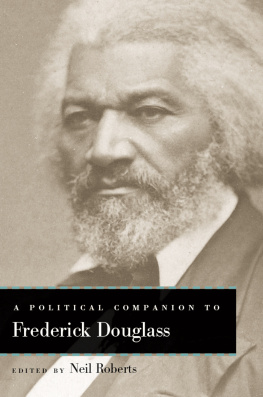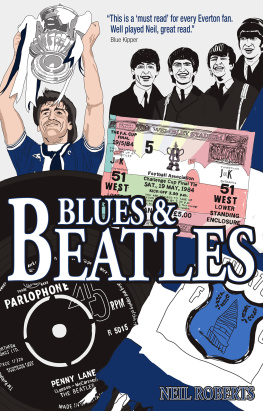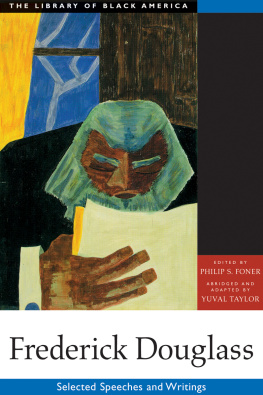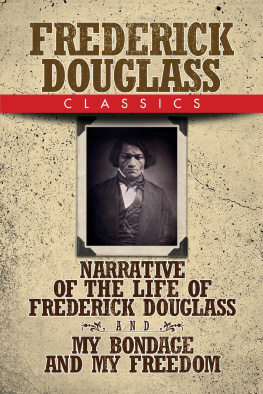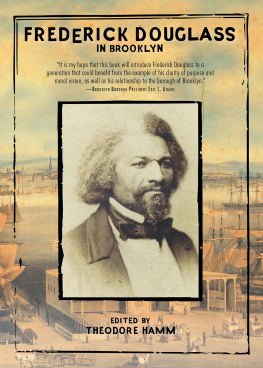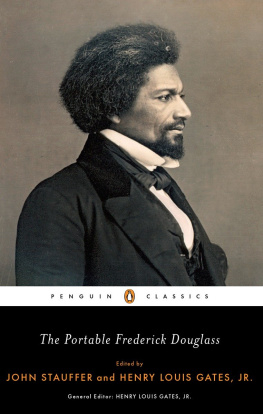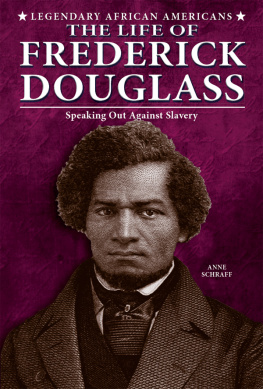
A Political Companion to Frederick Douglass
A POLITICAL COMPANION TO
Frederick Douglass
EDITED BY Neil Roberts

Due to variations in the technical specifications of different electronic reading devices, some elements of this ebook may not appear as they do in the print edition. Readers are encouraged to experiment with user settings for optimum results.
Copyright 2018 by The University Press of Kentucky, except where noted.
The University Press of Kentucky, scholarly publisher for the Commonwealth,
serving Bellarmine University, Berea College, Centre
College of Kentucky, Eastern Kentucky University,
The Filson Historical Society, Georgetown College,
Kentucky Historical Society, Kentucky State University,
Morehead State University, Murray State University,
Northern Kentucky University, Transylvania University,
University of Kentucky, University of Louisville,
and Western Kentucky University.
All rights reserved.
Editorial and Sales Offices: The University Press of Kentucky
663 South Limestone Street, Lexington, Kentucky 40508-4008
www.kentuckypress.com
Library of Congress Cataloging-in-Publication Data
Names: Roberts, Neil, 1976- editor.
Title: A political companion to Frederick Douglass / edited by Neil Roberts.
Description: Lexington, Ky. : University Press of Kentucky, 2018. | Includes bibliographical references and index.
Identifiers: LCCN 2017060706| ISBN 9780813175621 (hardcover : alk. paper) | ISBN 9780813175645 (pdf) | ISBN 9780813175638 (epub)
Subjects: LCSH: Douglass, Frederick, 18181895Political and social views. | Douglass, Frederick, 18181895Influence. | African American abolitionistsBiography. | Antislavery movementsUnited StatesHistory19th century. | United StatesRace relationsHistory19th century.
Classification: LCC E449.D75 P65 2018 | DDC 973.8092dc23 LC record available at https://lccn.loc.gov/2017060706
This book is printed on acid-free paper meeting the requirements of the American National Standard for Permanence in Paper for Printed Library Materials.

Manufactured in the United States of America.
Member of the Association of University Presses
For Santiago
and in loving memory of
Olive Gordon and Hyacinth Roberts
I, therefore, leave off where I began, with hope.
Frederick Douglass, What to the Slave Is the Fourth of July?
Contents
Patrick J. Deneen
Neil Roberts
Paul Gilroy
Because of rights restrictions, is not available in the electronic edition of this book.
Bernard R. Boxill
Margaret Kohn
Angela Y. Davis
Robert Gooding-Williams
Jack Turner
Ange-Marie Hancock Alfaro
Nicholas Buccola
Peter C. Myers
Vincent Lloyd
Anne Norton
Herbert J. Storing
Jason Frank
Nick Bromell
Illustrations
Series Foreword
Those who undertake a study of American political thought must attend to the great theorists, philosophers, and essayists. Such a study is incomplete, however, if it neglects American literature, one of the greatest repositories of the nations political thought and teachings.
Americas literature is distinctive because it is, above all, intended for a democratic citizenry. In contrast to eras when an author would aim to inform or influence a select aristocratic audience, in democratic times public influence and education must resonate with a more expansive, less leisured, and diverse audience to be effective. The great works of Americas literary tradition are the natural locus of democratic political teaching. Invoking the interest and attention of citizens through the pleasures afforded by the literary form, many of Americas great thinkers sought to forge a democratic public philosophy with subtle and often challenging teachings that unfolded in narrative, plot, and character development. Perhaps more than any other nations literary tradition, American literature is ineluctably politicalshaped by democracy as much as it has in turn shaped democracy.
The Political Companions to Great American Authors series highlights the teachings of the great authors in Americas literary and belletristic tradition. An astute political interpretation of Americas literary tradition requires careful, patient, and attentive readers who approach the text with a view to understanding its underlying messages about citizenship and democracy. Essayists in this series approach the classic texts not with a hermeneutics of suspicion but with the curiosity of fellow citizens who believe that the great authors have something of value to teach their readers. The series brings together essays from varied approaches and viewpoints for the common purpose of elucidating the political teachings of the nations greatest authors for those seeking a better understanding of American democracy.
Patrick J. Deneen
Series Editor
Introduction
Political Thought in the Shadow of Douglass
Neil Roberts
Our past was slavery. We cannot recur to it with any sense of complacency or composure. The history of it is a record of stripes, a revelation of agony. It is written in characters of blood. Its breath is a sigh, its voice a groan, and we turn from it with a shudder. The duty of to-day is to meet the questions that confront us with intelligence and courage.
Frederick Douglass, The Nations Problem (1889)
Intellectual Horizons
Interpreting the political thought of Frederick Douglass (18181895) requires close attention to time. Douglass was nearly fifty when the Civil War ended, and he lived another thirty years afterward. Although the division of years between the ante- and postbellum periods in Douglasss life wasnt as equally split as the years before (thirty-five) and after (thirty-four) the German migr political theorist Hannah Arendt arrived in America,1 the bloody intrastate struggle over slavery and the fate of the American republic was a critical marker for Douglass. Yet to situate Douglasss political thought in either an antebellum period or a postbellum period elides the major thematic areas that cut across Douglasss oeuvre, select changes in his positions within those eras notwithstanding.
Consider a series of critical junctures. Douglass was six years old when, as an enslaved being, chattel, a person reduced to the category of thing, he was brought to Colonel Edward Lloyds plantation off the Wye River on Marylands Eastern Shore; eight when sent to Baltimore to live under the mastery of Hugh and Sophia Auld; an unsweet sixteen when outsourced to the slave breaker Edward Covey; twenty when he escaped from Maryland as a fugitive, disguised as a sailor; twenty-three when he began speaking as a lecturer for the Massachusetts Anti-Slavery Society under the influence of Garrisonian abolitionists; twenty-seven when Narrative of the Life of Frederick Douglass, an American Slave, Written by Himself was published and he left for Great Britain for twenty-one months; twenty-nine when he launched the paper the North Star with Martin Robison Delany; thirty-three when the first printing of Frederick Douglass Paper materialized; thirty-four at the time of delivering the oration What to the Slave Is the Fourth of July?; midthirties at the time of his increased focus on Caribbean and Central American politics; thirty-seven when his second autobiography,
Next page
